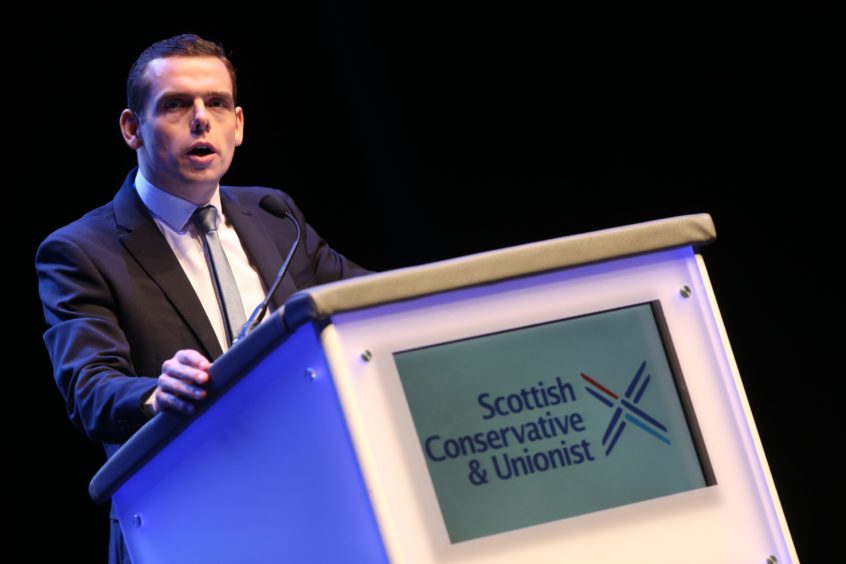The Scottish Government will write down around 200,000 hours of unpaid work for criminals and has been asked to consider banning sentences of 12 months or less, a leaked document suggests.
Justice Secretary Humza Yousaf has been urged to explain his actions by the Scottish Conservatives after the contents of the confidential report by the Convention of Scottish Local Authorities (Cosla) came to light.
The document has been prepared to examine the impact of Covid-19 on the justice system.
Scottish Tory leader Douglas Ross warned sentencing risked becoming a “meaningless sham” and there was a threat that public confidence in the justice system would be destroyed.
The Cosla report revealed criminals across Scotland sentenced to community service have failed to complete more than 700,000 hours of unpaid work.
The document claims the Scottish Government “responded positively” to social work calls to write off a large amount of the backlog – around 30 per cent which amounts to 210,000 hours.
Victims will despair while criminals will rejoice. As a matter of urgency, the SNP justice secretary must explain what action he intends to take. If this is not dealt with, there is a real risk that sentencing will become little more than a meaningless sham and public confidence will be destroyed.”
Scottish Conservative leader Douglas Ross
The report, dated October 2020, states: “Social Work Scotland [SWS] has estimated that the current backlog is approximately 700,000 hours of unpaid work.
“SWS state that some 450,000 hours will not be able to be serviced in any reasonable timeframe.
“Cosla recommended to the Scottish Government that they consider the SWS proposals believing that a reduction of around 30% of unpaid work hours would be very helpful.
“The Scottish Government responded positively and is intending to use powers under the Coronavirus Act to allow the proposed reductions.
“The regulatory detail is still being worked and would apply the reductions generally except for certain categories of offences such as domestic abuse and sexual crime.
“The Scottish and Local Government are both likely to need to consider a total reduction of around 60% of unpaid work hours – as originally recommended by SWS – to make the situation more manageable.”
The Cosla report also reveals that one of the options presented to ministers by Community Justice Scotland (CJS) is the “abolition” of short-term prison sentences of less than a year.
It describes the proposal as “changes to legislation which remove the option of prison sentences of 12 months or less, and the introduction of more robust and effective community sentences”.
The Scottish Conservatives warned that outlawing short sentences would have meant letting criminals walk free who were guilty of crimes including homicide, attempted murder, rape/attempted rape, violent robbery and sexual assault had a ban come into force in 2018/19.
At present there is an ever-increasing gap in the time between a person being charged for a crime, sentencing and a community-based punishment being served. At the same time a significant proportion of trials continue to be adjourned, leaving victims feeling vulnerable and without redress.”
Leaked Cosla document
The Scottish Conservatives were the only party to oppose the SNP’s move in June 2019 to instruct judges to avoid imposing prison sentences of 12 months or less. But the Cosla document proposes going further by removing judicial discretion from the process and moving to an outright ban.
Mr Ross said: “The huge number of unworked hours is extraordinary but behind these numbers are real people who face being cheated of justice.
“Victims will despair while criminals will rejoice. As a matter of urgency, the SNP justice secretary must explain what action he intends to take. If this is not dealt with, there is a real risk that sentencing will become little more than a meaningless sham and public confidence will be destroyed.”
The document also warned that if the backlog was not addressed there was a “major risk” that Justice Social Work would be “overwhelmed, with serious consequences for the wider justice system and its reputation”.
It added: “At present there is an ever-increasing gap in the time between a person being charged for a crime, sentencing and a community-based punishment being served.
“At the same time a significant proportion of trials continue to be adjourned, leaving victims feeling vulnerable and without redress.”
A Scottish Government spokesman said: “We are not proposing a ban on sentences of a year or less. Our presumption against short sentences which was backed by the majority of the Parliament and experts in criminology as the right approach to help reduce reoffending was extended from three months to 12 months in 2019.
“As regards community orders, the difficulties faced by justice social work in delivering these during the pandemic was acknowledged by the Scottish Parliament through the Coronavirus (Scotland) Act 2020, which extended timescales for completion of unpaid work and created new powers enabling community orders to be postponed or varied if necessary.
“Following significant concerns raised by Social Work Scotland during the summer, the Cabinet Secretary for Justice wrote to the Justice Committee to confirm that consideration was being given to whether these powers may need to be used, on a proportionate and limited basis, with regard to unpaid work.
“No decision has yet been made, and any action to vary community sentences would not be taken lightly and would be subject to parliamentary scrutiny and approval.
“Scotland’s police, prosecutors, and courts continue to bring to justice those who commit crimes, and sentencing in each case is rightly a matter for the independent judiciary. Their approach is working ,with reconviction rates for offenders in Scotland falling to its lowest ever level since comparable records began 21 years ago.”

